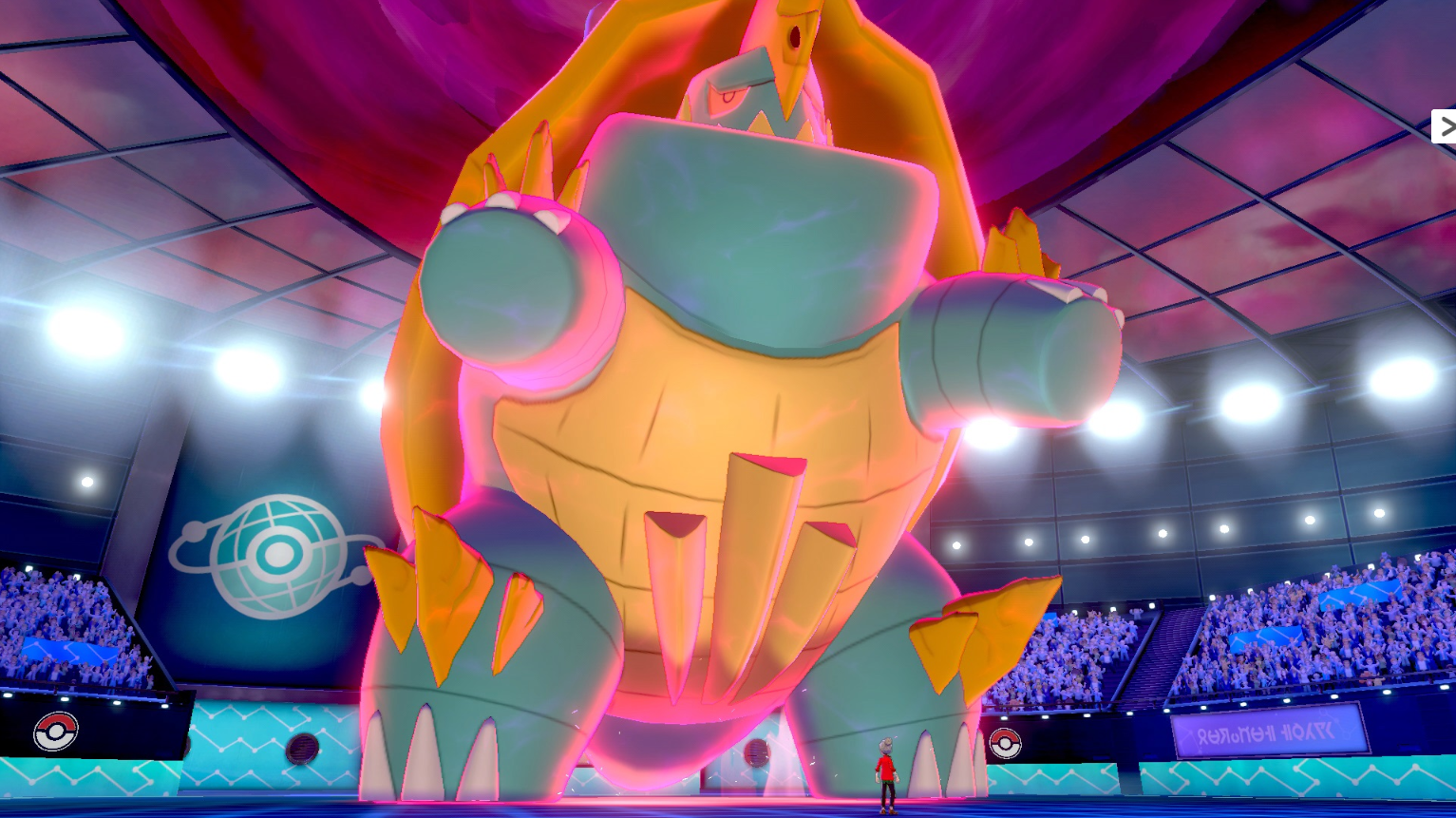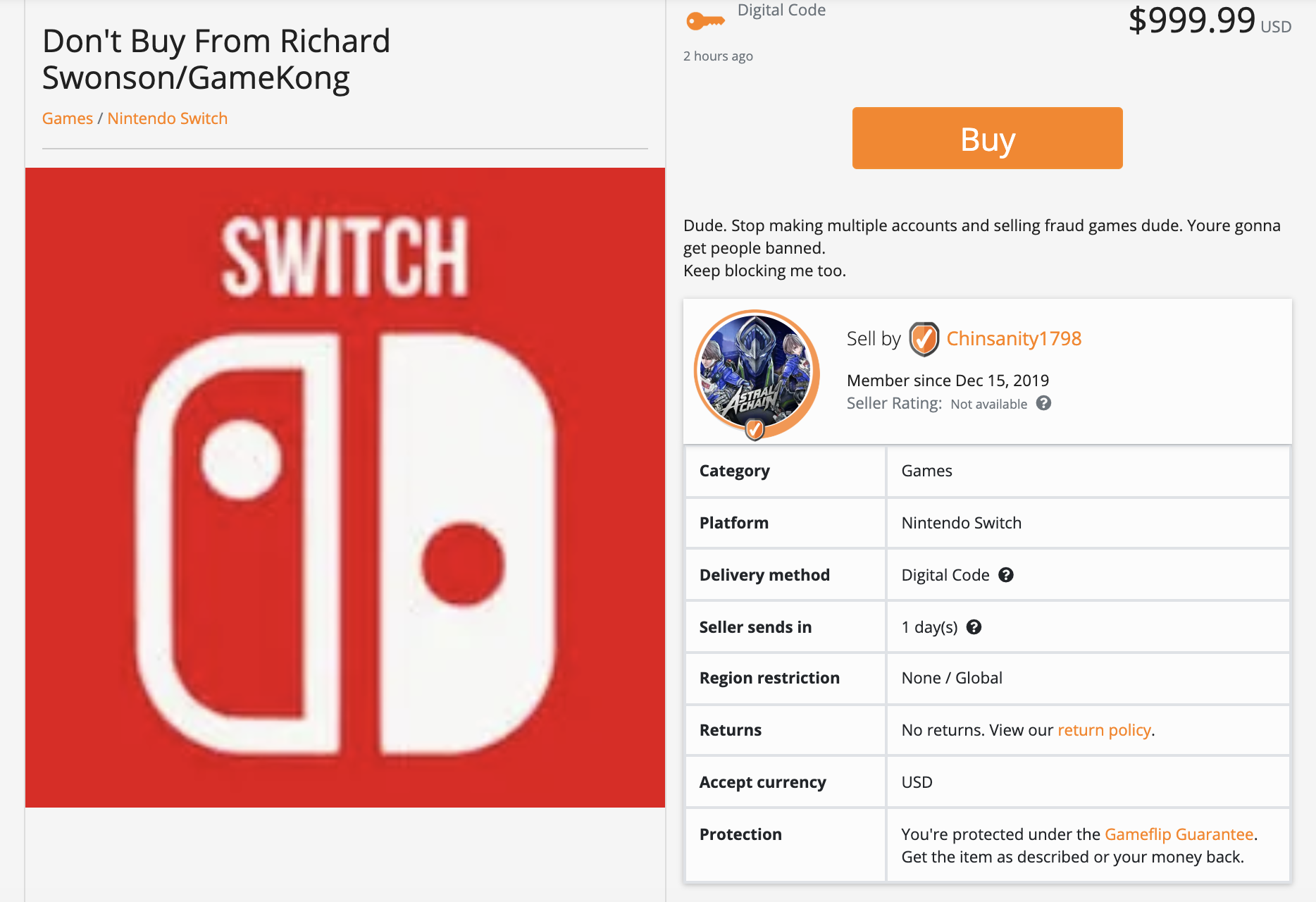Most games cost $60 these days, and if you want to play a lot of them, that can add up quickly. It's one reason why many players turn to third-party online stores, where they can buy Nintendo games for cheap instead of buying them from Nintendo directly. Historically, Nintendo games rarely go on sale. But how many would go down that path if there was a chance that buying from these stores could result in all of your games being taken away?
This is exactly what’s happened to a number of Switch owners. They bought a code for a Switch game from Gameflip, an online marketplace where anyone can sell codes and other digital items. Shortly after, they discovered that Nintendo banned their Switch account, preventing them from accessing not only the game they bought from Gameflip, but all previous purchases. When they contacted Nintendo's customer service department, users were told there was nothing Nintendo could do about it. The company had little help to offer, and the bans stayed in place.
But in recent weeks, Nintendo has updated its fraud policy, according to internal Nintendo documentation obtained by VICE Games, and it could mean those users will regain access to their accounts and all the games that were purchased on it. Previously, the policy was to simply ban users, and there was very little recourse available.
Our source agreed to speak under the condition of anonymity because they are not authorized to speak publicly about Nintendo's internal processes.
Now, according to the updated policy, after someone shows proof of attempting to dispute the original purchase and pursue a refund, Nintendo can lift the ban. This can happen by attempting to get a refund from the seller (or the website where the code was purchased) or disputing the charge with their bank or card holder. The game downloaded with the code will no longer be in the user’s library, but they can purchase it again. This policy update also comes with another warning: if the user encounters the problem again, Nintendo will issue a permanent ban.
“Nintendo is dedicated to providing its fans a fun and welcoming environment,” said Nintendo in a statement to VICE Games. “To that end, we take steps necessary to prevent fraudulent activity. Fans interested in purchasing digital content, or codes to download that content, can always do so through the Nintendo eShop, Nintendo.com, or from authorized retailers.”
The company did not comment on the specifics of the policy.
Getting banned by Nintendo on Switch has harsh consequences; an infraction locks the owner out of their entire library. The ban also applies to the totality of Nintendo online services for that account, which means you can no longer play online or download Mario Maker levels. In the past, Nintendo has punished particularly egregious infractions with a hardware-level ban, which means Nintendo uses the unique key that every single console gets and bans it from their network forever. In this case, the ban is applied at the account-level, which means you can start a new account on the same Switch that will work online, but that also means having to rebuy every single game. That can get expensive fast.
It's important to stress that some of the people getting banned weren't attempting to steal a game, they simply thought they were buying an extra game code from a third-party market. I’ve talked with two Switch owners who were scammed while purchasing a code on Gameflip, an online marketplace where anyone can sell codes and other digital items. The fear was earned. For the past month or so, Nintendo has banned a lot of people—see this thread on reddit, and the multiple forum threads on Gameflip’s own website—due to fraud.
At least some of the people who were banned by Nintendo fell for a simple scam: the seller offers a legitimate download code for a game on the online marketplace Gameflip for cheaper than full price.
The buyer redeems that code on Nintendo’s eShop, and in short order, starts playing away. Everyone is happy. But at some point, if the code was initially bought with a stolen credit card and the owner of that credit card issues a chargeback, Nintendo flags the code as illegitimate and suspends the account that redeemed it. The person who illegally purchased the code was the criminal, but the person who bought the code suffers the punishment.
The difference is other platforms facing the same issue, like Steam, have public policies. There is always going to be active interest in buying cheap games, however sketchy it is. It’s not illegal to sell a code, nor it is illegal to buy one.

Reid, who asked to remain anonymous so as not to be associated with the scam, was one of many caught up in this scam. Reid was tempted by a chance to buy the new Pokémon game and save a few bucks, so they bought a copy of Pokémon Shield for $38 from a Gameflip a seller named “Nintendoshop,” who has been mentioned multiple times in several complaints by Gameflip users. Shortly after, their account was banned.
“I contacted Nintendo immediately and they asked about my recent purchases,” said Reid. “They said the banning was related to that game but wouldn't tell me why specifically.”
A version of this same story was repeated in conversations with me and among frustrated players on various online message boards. Nintendo would confirm it was banning the account because of a recent purchase, but could not explain exactly what had happened.
“I’m dealing [with] the same issues right now,” wrote a buyer on Gameflip. “I bought 3 games from the same dealer, nintendo banned my account and removed one of the games in the process, and now I’m trying to get it reactivated and refunds for the games. Wish me luck.”
A Nintendo customer service representative told Reid he’d hear back in a few days.
“It's been a month and no updates,” Reid told me in early January. “Still banned.”
This became such an issue on places like Gameflip that users were pulling stunts to get attention. Last week, someone published a fake $999.99 listing called “Don’t Buy From Richard Swonson/GameKong.” The listing, which has since been taken down, had a warning: “Stop making multiple accounts and selling fraud games dude. Youre gonna get people banned.”

Commentors supported the warning, with one person admitting they’d purchased several codes from the same individual and worrying that ”it’s just a matter of time till I get banned.”
Several hours after being contacted by VICE Games last Friday, Gameflip announced it was “temporarily” removing the ability for its users to even sell Nintendo games digitally.
“We acknowledge that Gameflip users have reported their Nintendo accounts getting suspended a few days after redeeming codes that were purchased within our marketplace,” the company said in a statement to VICE Games, “and we are working very closely with them by providing support, issuing refunds and taking all necessary actions to prevent Gameflip and Nintendo users from being exposed to malicious sellers again.”
Gameflip does check the identity of its sellers, and said those who’d sold fraudulent codes had been suspended. This does not, however, prevent folks from running the same scam in the future. Fraud is not unique to Nintendo or the Switch.
Fraud is always going to exist, no matter what Gameflip does. The problem was Nintendo not having a specific policy to deal with users affected by fraud. Nintendo is not responsible for users taking a risk when they buy from the grey market, as opposed to an established retailer or Nintendo itself, but ignoring the grey market can hurt its customers unfairly. People are absolutely going to spend less money if they can! They should not be punished for it.
Once Nintendo rolled out its updated policy, which happened sometime around the holidays, people who contacted Nintendo started getting accounts unbanned. It was not an isolated incident, either. Over and over, people were successfully seeing the ban lifted. This included Reid, the person who’d been caught in the scam over a cheap copy of Pokémon Shield.
Reid requested a refund from Gameflip over the fraudulent code, and after sending Nintendo some proof, they restored the account. Here’s how Nintendo explained it in an email to them:
“Regarding your recent request, I’m pleased to report we approved the release of the ban on your account. You may access online features immediately and will be able to resume eShop transactions within 2 business days. The digital content tied to the unauthorized transactions has been deleted.
Please keep in mind that any new unauthorized transactions reported on this account will result in a permanent ban.”
Later that day, Reid was able to get back online and access their old games. Weirdly, they were also still able to play the copy of Pokémon Shield that was supposed to be removed from their account. Other users have reported being able to access old saved games, as well. This is likely a glitch or oversight. You are not supposed to keep a copy of the game.
Nintendo now has a policy to deal with fraud, which is good. Ultimately, though, the company would prefer users always buy games through official channels, like Nintendo’s own online store, because it means they're paying full price for them.
These recent account scares may end up encouraging exactly that.
“This ordeal has definitely made me hesitant to buy anything Nintendo related at all from Gameflip,” said one user. “I’m not sure I want to risk buying anything because of how many games I have bought on the Eshop. Anything could happen, and I don’t want to be permanently banned. A shame too, as I was able to get some games at good prices before.”
Follow Patrick on Twitter. His email is patrick.klepek@vice.com, and available privately on Signal (224-707-1561).
from VICE https://ift.tt/31teRIx
via cheap web hosting
No comments:
Post a Comment